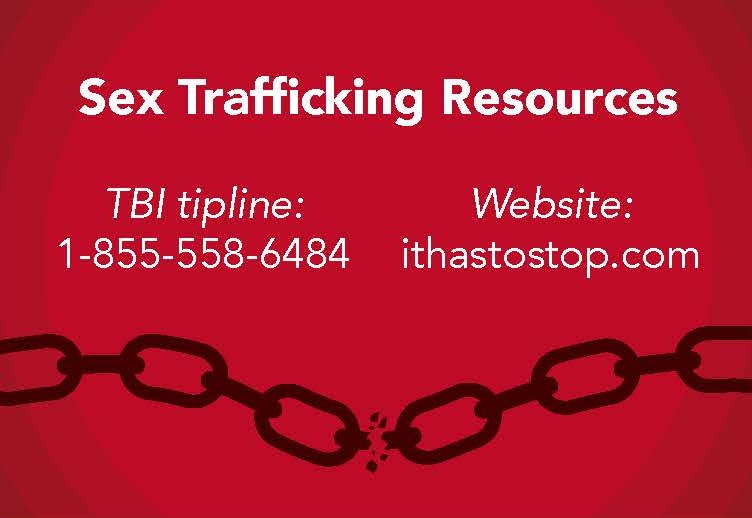
9 minute read
Trafficking Signs
MTSU professor and student help inform law enforcement training to assist sex trafficking victims
Article by Carol Stuart
When the Tennessee Bureau of Investigation’s Human Trafficking Unit receives a 3 a.m. call after a state trooper notices a possible sex trafficking victim, the person in that pulled-over vehicle may initially reject an agent’s assistance.
“You’re the police, and they’ve been groomed to hate you, and we’re there to take you away from what they’ve been told,” said Jeremy Lofquest, assistant special agent in charge of the unit.
But down the road, after receiving specialized assistance and therapies from service providers and programs, such victims sometimes return to express their gratitude and tell of their changed lives.
“ ‘Because you pulled me out of that car and you didn’t listen to me call you every name but Jeremy, and . . . showed me there is a way out of this, I’ve graduated high school now’—or gotten a college degree, gotten a job, or now living in their own apartment. You’re seeing someone get their whole life back on track that you don’t get to see in a lot of other criminal investigations,” Lofquest said.
Helping law enforcement officers throughout the state identify, rescue, and assist sex trafficking victims is an impetus for a research project launched by MTSU’s Rachel Davis, a Sociology assistant professor, and undergraduate Melissa Guinn.
A senior majoring in the new Cybersecurity Management program, Guinn aspires to apply her skills to tracking online predators, perhaps for the FBI, and hopes to also start a nonprofit for victim advocacy. While taking Davis’ Sex Trafficking course online, she approached her professor about collaborating on a project.

SURVEYING STATE OF THE STATE
Davis suggested using hypothetical vignettes to survey law enforcement across the state, similar to her own planned research project about people’s perceptions of campus sexual assault.
“I decided that I wanted to focus on law enforcement’s perceptions,” Guinn added, “because how they think of not only the victim but the scenario itself plays a part into the justice and the help that that victim is going to receive.”
The two developed vignettes about sexual assault and sex trafficking to help illuminate any concerns about officers’ training, recognition of situations, and specific challenges. They plan to present detailed findings to the TBI this semester, particularly related to runaway youth. They shared some preliminary results in a poster session at the American Society of Criminology conference last November, are presenting at the Southern Sociological Society this spring, and are seeking grants to expand the project nationally.
“We’re really hopeful that this can highlight blind spots in law enforcement’s training related to sex trafficking and can highlight ways that we can strengthen our cultural response to sex trafficking and not just rely on law enforcement,” Davis said. “Because, as they mentioned in their responses, their hands are tied related to certain things.”
IT’S AN ISSUE THAT’S ALL THE WAY ACROSS THE STATE, BORDER TO BORDER.

A BATTLE BORDER TO BORDER
In Tennessee’s metropolitical areas, sex trafficking victims are more likely trafficked through “pimp-driven” forced prostitution or by foreign nationals or transnational organizations, Lofquest said. In early January 2025, for instance, agencies at all levels raided a suspected brothel in Nashville allegedly involved in other criminal enterprises.
However, in rural areas, victims are often sex-trafficked by their families—or through other grooming situations—and investigations are more complex “to uncover the trafficking and not just view it as a child abuse or molestation or statutory rape,” Lofquest said.
In each of the past two years, the agency received approximately 1,300 tips and leads for human trafficking (including labor trafficking), all checked out by analysts and its nine agents, but it had seen 30% year-over-year growth several years previously.
“It’s an issue that’s all the way across the state, border to border,” said Lofquest, a former U.S. Marine who then earned his college degree and became a TBI agent in Chattanooga.
A major public (mis)perception of typical sex trafficking—a child or other person being abducted from a parking lot and sold into sex slavery—is a much smaller percentage in the U.S. compared to worldwide, the local experts say. In other parts of the world, debt bondage also is a top type of human trafficking.
“It’s all horrible. It’s a horrific crime,” Lofquest said. “And we have it all in Tennessee. And we do what we can to attack it all.”

IDENTIFYING UNDERAGE VICTIMS
Law enforcement agencies in Tennessee may receive training on the topic from others that is well-intentioned and -designed. But the TBI, which has partnered with MTSU in other criminal justicerelated research, wants to offer local officers information relevant especially to Tennessee, including the state’s laws.
The agency welcomes Davis and Guinn’s research to gain feedback from subject experts that can be used in law enforcement training, as well as to increase public awareness.
One scenario in the survey—and the one requested by the TBI—actually proved to be the most interesting and “most concerning” according to early qualitative findings, Davis said.
The TBI wanted to know how officers would handle a scenario typical for juvenile or child sex trafficking: “They’ll get a call to go to a motel,for instance, about a domestic dispute and then find an underage person there with evidence that maybe drugs are being used or evidence that sex has taken place,” Davis said. “And often it’s like a chronic runaway victim. And those are like telltale signs that this might be a trafficking case, but they wanted to know: ‘Will the officers identify it as a trafficking case?’ ”
THE TBI WANTED TO KNOW HOW OFFICERS WOULD HANDLE A SCENARIO TYPICAL FOR JUVENILE OR CHILD SEX TRAFFICKING.
Some did suspect potential trafficking, but most officers responding to the survey also indicated they would encourage parents to file an unruly petition in Juvenile Court—some, in part, to get the youth connected to services, Davis said.
“We found that minors who were considered chronic runaways or minors when they began being trafficked were actually the most likely to be seen as delinquent or criminal compared to adult victims in other cases that were seen as a victim,” Guinn added. Some said they “should maybe even charge the parents.”

FIRST-GEN AND PARENT PERSPECTIVE
After Guinn graduated from Blackman High School in 2019, and before taking a break from college during the COVID-19 pandemic, she never envisioned an opportunity to do undergraduate research. She’s especially grateful for MTSU’s Undergraduate Research Experience and Creative Activity (URECA) grant program. URECA helps offset students’ need to work and paid for most of Guinn’s conference trip along with other MTSU student funds.
“I am a first-generation college student, so I was not expecting to do more with my college career than just focus on studying and getting my degree,” Guinn said. “. . . The fact that MTSU has a program for undergraduates to conduct research has been so impactful.”
Like many students at MTSU, which attracts a high number of first-gen and Pell-eligible students, Guinn works while attending college— holding an on-campus job.
Now a mom to a 2-year-old son, Guinn also is considered a nontraditional student as she returned to finish her studies by May 2026. She was already concerned about relaxed social media regulations for children in the U.S., her generation’s unmonitored access to the internet, and “plenty of people” she knows affected by online victimization.
IN EACH OF THE PAST TWO YEARS, THE AGENCY RECEIVED APPROXIMATELY 1,300 TIPS AND LEADS FOR HUMAN TRAFFICKING.
Deciding to take Sociology courses to obtain a sociological perspective along with her Cybersecurity Management technological training, Guinn found both a research partner and a “great mentor” in Davis.
An east Tennessee native whose doctorate includes a concentration in Criminology, Davis also has published research relating to transactional sex and social media and has a book proposal in the works. Much of her research looks at how nonconsensual sex trafficking, consensual sex work, and transactional sex (like “sugar”-type arrangements) can be conflated and thus cause harm—such as criminalizing victims.
EXPANDING NATIONWIDE
Although limited response from Tennessee jurisdictions on the sexual assault and sex trafficking survey affects Davis and Guinn’s quantitative analysis, quality qualitative data showed that most officers replying did recognize the need to bring in expert resources. However, a lot of the officers noted legal limitations to prosecute cases, such as definitions in Tennessee’s lenient statutory rape law; statutes of limitations; and coercion instead of verbal or physical refusal—especially when alcohol is present for both the victim and suspect, according to one respondent.
Some officers’ suggestions to charge a child victim, usually along with the alleged perpetrator, in the one scenario seemed connected with the way Juvenile Court operates, Davis said.
“It’s kind of a dual system where it doles out punishment AND services,” she said.
In a lot of cases, “the child may think that they are in a situation they want to be in” and otherwise decline services, Davis added. But a chronic runaway may be being trafficked by family members or others they’re living with, she said. Lofquest, meanwhile, notes that the TBI would never recommend putting a child into the criminal justice system just for services’ sake and promotes a victim-centric mindset.
Guinn and Davis hope surveying law enforcement across America will increase sample size, allowing more robust data analysis.
After all, the MTSU researchers want to offer any improvements to address sex trafficking, “whether that’s a policy improvement, a training improvement, awareness campaign improvement,” Guinn said, “just to help law enforcement members really see the victim and know how to best handle the situation that is victim-centered.”








